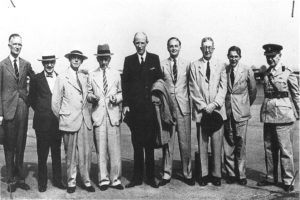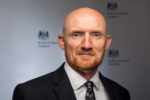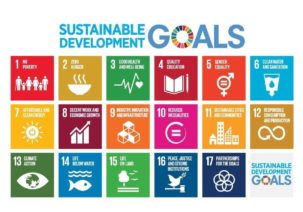FCDO Principal Historian
Part of FCDO Historians UK at the UN
23rd October 2020 London, UK
The Foreign Office and the creation of the UN
Pub quiz question: where was the first meeting of the United Nations (UN) General Assembly held?
Answer: London, in the Methodist Central Hall on 10 January 1946.
London features heavily in early UN history. The Security Council met for the first time in Church House, Westminster, the following week. Church House was also the location for the UN Preparatory Commission, which convened in the autumn of 1945 to decide the administrative framework for the new organisation.
Foreign Office officials played a key role in planning and establishing the UN at the Dumbarton Oaks conference (August to October 1944), where the Big Four met to discuss setting up a new international body to replace the League of Nations. They played a similar role at the subsequent United Nations Conference on International Organization, which met in San Francisco (April to June 1945) and culminated with the signing of the UN Charter on 26 June.

Gladwyn Jebb, head of the Foreign Office economic and reconstruction department, had, according to British foreign secretary Ernest Bevin, “done more than any other man, official, or politician, to make the UN into a ‘living thing.’” Jebb was present at all the big wartime conferences —Tehran, Yalta, Potsdam— and involved in the discussions at Dumbarton Oaks and San Francisco. He was the executive secretary of the Preparatory Commission, and acted as UN Secretary-General until Trygve Lie was appointed to the role February 1946. Jebb later went on to become British representative at the UN in June 1950.
Jebb was assisted by historian and ardent internationalist, Charles Webster, seconded from academia to the Foreign Office Research Department. He brought with him his vast knowledge of peace making, stretching back to the Congress of Vienna, and personal experience as a British delegate to the Versailles Peace Conference of 1919.
Another key personality was Sir Alexander Cadogan, the Permanent Under-Secretary at the Foreign Office. Cadogan was head of the League of Nations department in the 1920s and well aware of the flaws that any new body would need to avoid. Cagodan, along with British ambassador to the US Lord Halifax, headed the British delegation at Dumbarton Oaks. In February 1946, he was appointed as the first UK Permanent Representative to the UN, a sign of the importance that Prime Minister Clement Attlee attached to the role.
Sir William Malkin, the Foreign Office legal adviser, was present at San Francisco where he made an important contribution to drafting the Charter and planning for the new International Court. Sadly, on the journey home his plane crashed into the North Atlantic killing him and others in the British delegation, including Colonel Denis Capel-Dunn, Secretary to the Joint Intelligence Committee.
Despite their contribution, British officials were content to downplay their role in favour of the Americans, in order to prevent the US from retreating into international isolation as they had done after the First World War. Officials were pragmatic, seeing the UN as a means through which Britain could continue to play a leading role in world affairs in the post-war era. They avoided the more idealistic notions of what a new world system might hope to achieve. This view was partly vindicated when East-West rivalries began to make themselves felt from late 1946 and early hopes of international cooperation between Security Council members faltered. Yet officials never thought their efforts had been in vain, ultimately believing that it was better to have an imperfect organisation, as a forum for international dialogue, than no organisation at all.
You can read Gladwyn Jebb’s reflections on the San Francisco conference in Britain and the making of the Post-War World.
Related posts:
23rd October 2020
Sarajevo, Bosnia and Herzegovina
75. rođendan UN-a 
by Matt Field
British Ambassador to Bosnia and Herzegovina















